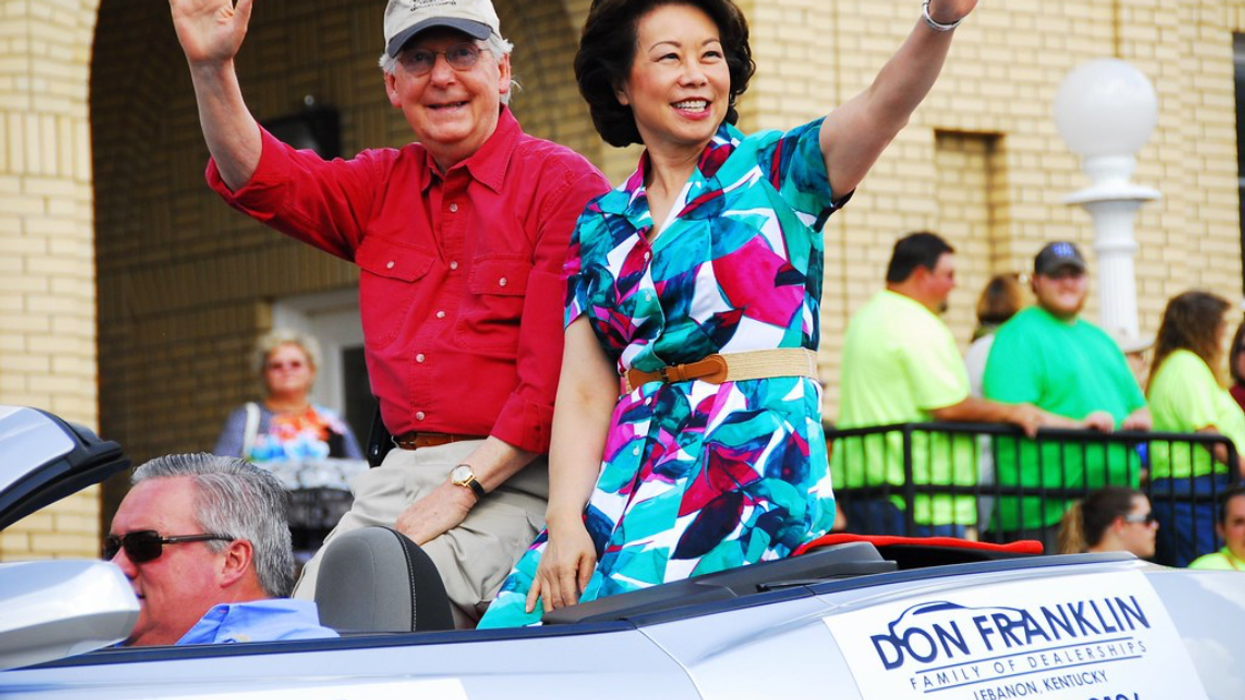Why All Roads For Infrastructure Lead Through West Virginia
Reprinted with permission from DC Report
Moderate Republicans have announced a counter-offer to the Biden administration's $2 trillion-plus infrastructure proposal.
Led by Sen. Shelley Moore Capito (R-WV), the moderates put out a two-page glossy marketing blurb that significantly scales down Biden's package. It cuts critical infrastructure investment and has a price tag of $568 billion.
Some of the ways Republicans suggest going from $2 trillion to $568 billion are by cutting the investments in safe drinking water and essential repairs on public schools.
As it happens, Capito's own state of West Virginia is playing a pivotal role in hindering Biden from moving forward with his historic infrastructure package. The two senators from West Virginia—Capito and Joe Manchin (D-WV)—may be from opposing sides of the aisle, but they have each put up similar obstacles that the Biden team must navigate to get its much-needed infrastructure package through.
No Corporate Tax Increase
The common theme among the two West Virginian senators? Both senators are doing their best to ensure that wealthy corporations don't have to pay for the much-needed upgrades of the nation's infrastructure.
Their views ignore two big problems for the majority of their constituents: West Virginia desperately needs infrastructure improvements, and both senators promised constituents they were going to advocate for, not obstruct, it.
In a unique power dynamic, West Virginia's Manchin is the Democrats' major roadblock in passing Biden's plan by threatening to vote against the bill, while Capito is the GOP's point person in trying to severely trim a package that could add 2.7 million jobs.
Manchin's reasoning? He says he won't vote for the bill if the corporate tax rate is raised from the 21 percent rate enacted under Trump to 28 percent. The rate before Trump was 35 percent, so the Biden plan is a halfway restoration.
The GOP plan announced by Capito doesn't have any mention of corporate America paying for the plan. Instead, the GOP suggests that users of electric vehicles get taxed.
A 51-Vote Majority
The Senate parliamentarian ruled, that a simple majority of 51 Democrats can pass Biden's infrastructure package and some other legislation, circumventing the Senate's arcane filibuster rule that requires 60 votes for most legislation.
But this only works so long as all 50 Democrats are unified, allowing Vice President Kamala Harris to break the tie.
That Democrat Manchin won't vote for the bill if the corporate tax is increased, the other West Virginia senator in a unique position. Capito is standing somewhere between Biden and Mitch McConnell (R-KY) The notoriously obstructionist Senate minority leader, McConnell vowed that no Republican will vote for Biden's proposal.
But McConnell will have an especially tough time corralling all Republicans. Many promised major infrastructure spending all throughout the Trump presidency but never delivered—not even when the party held majorities in both houses of Congress.
As far back at the Continental Congress, infrastructure spending has been the preferred bring-home-the-bacon move for representatives and senators. There are few less controversial ways to spread federal dollars on home-state projects.
And in recent months a loose, if tight-fisted, coalition of Republican senators has emerged, showing some willingness to stray from McConnell's sternly shepherded senatorial flock. In February, seven senators voted to convict in Dinald Trump's second impeachment trial. And 10 Republican senators, including Capito, proffered a Covid relief package that, like Thursday's infrastructure counteroffer, would have cost hundreds of billions less than Biden's.
Both Manchin and Capito say that they want to improve their desperately poor state's infrastructure. Twenty percent of West Virginia's bridges are deemed structurally deficient, the worst in the nation. West Virginia broadband quality and access rank 45 out of 50. And the state has the worst drinking water in the country.
In November, Manchin and Capito jointly secured a federal investment of $485,000 to improve water from the Appalachian Regional Commission (ARC), a partnership between the federal government and 13 states. Biden just nominated Joe Manchin's wife Gayle Manchin to be the co-chair of ARC.
The two senators put out a joint statement taking credit for the ARC money, and Manchin promised to keep fighting for more "good-paying jobs and ensuring our fellow West Virginians have access to basic human needs such as clean drinking water."
Biden's infrastructure plan invests $111 billion to improve water infrastructure. So why isn't Manchin advocating for West Virginia's share of this historical and unprecedented level of investment?
"Everything that's being proposed is a drop in the bucket compared to what's needed," said Stephen Smith the co-chair of a group called WV Can't Wait.
Big Campaign Donors
Overall, Smith speaks of West Virginia with pride, but he also points to frustrations after 150 years of "outside interests getting rich off of West Virginia. First timber; then coal; now natural gas, agribusiness and Big Pharma."
So it's no surprise to Smith that Manchin may hold up national legislation to protect corporate interests, "His top donors are financiers, corporate leaders—he doesn't answer to the people of West Virginia. He's made a career of doing for those at the top."
Eric Engle, of the Mid-Ohio Valley Climate Action Group, also supports Biden's infrastructure bill. He considers the climate change component of the bill a game-changer for the Mid-Ohio region.
"This infrastructure bill is an enormous start, and we support it." He points to all of the jobs it probably would create in West Virginia: "Good jobs, union jobs, family-supporting jobs, living wage jobs and all with a focus on a sustainable green economy."
Like Smith, Engle isn't surprised Manchin—whom he calls "DINO Joe," as in Democrat in Name Only—may block any investment:
"If you're a Democrat, why are you blocking your own party's initiatives? Why is it that the vast majority of the time you seem to be more supportive of the Republican objective?"
Arguably, since Trump overwhelmingly won in West Virginia, a Democratic senator is considered especially vulnerable in the state. Both Engle and Smith dismiss this as a media narrative not reflective of reality.
Manchin, who was governor before running for the Senate, is not up for re-election until 2024. "If he keeps holding up progress on the Democratic platform in the Senate," says Engle, "no West Virginia Democrats are going to vote to re-elect him."
Powerful Position
All this again puts Capito in an unusually strong bargaining position. Despite her own low-ball proposal, Capito is on the record saying there's plenty in the Biden plan that she likes. She expressed confidence after a February White House meeting with Biden and Transportation Secretary Pete Buttigieg, and last month she positively promoted parts of Biden's plan.
Capito is leading the infrastructure negotiations. But it remains to be seen whether she—like Sen. Susan Collins (R-ME), who led moderate Republicans to offer a severely downsized version of the Covid bill—will, in the end, choose to vote no if Biden turns down her skinflint counterproposal.
Unlike Collins, who had no particular dog in the Covid hunt, Capito has long tied her political fortunes to winning federal dollars for West Virginia improvements. To ultimately obstruct her very own pet projects would, no doubt, leave her with a lot to explain to folks back home.
If Biden and the Democrats find themselves scrambling for 50 votes, they might still have to make a pilgrimage to West Virginia—to woo Capito rather than Manchin.
They'll just have to hope that bridge doesn't collapse as they cross it.



